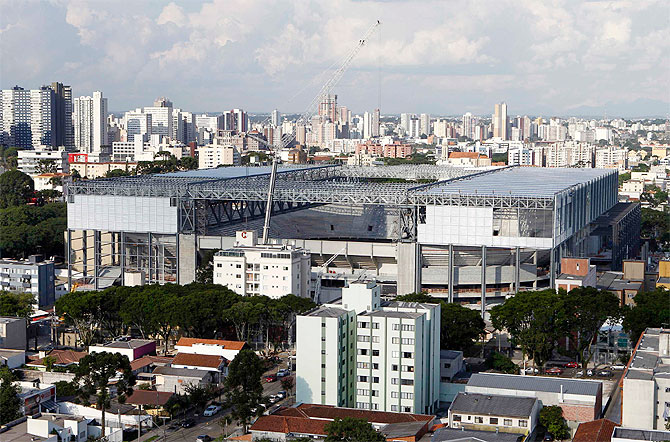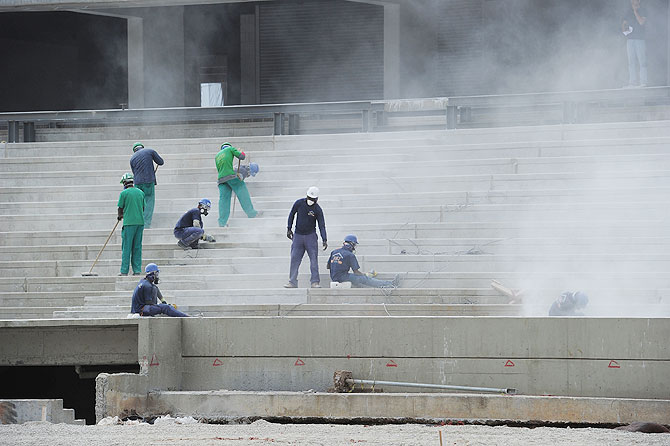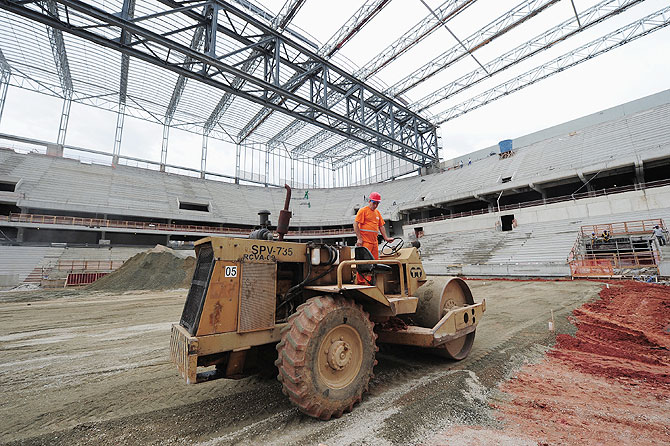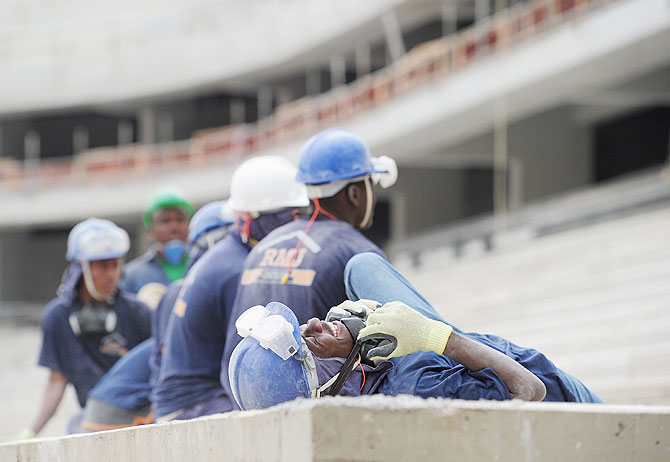 | « Back to article | Print this article |
Brazil's laggard stadium risks missing World Cup deadline
When Brazil chose 12 cities to host the 2014 World Cup, the one stadium everyone thought would be finished on time was the Arena da Baixada in Curitiba.
Built in 1999, the arena was the most modern in Brazil.
Its owners, the Atletico Paranaense club, were known for their fiscal prudence and good management. And the city itself, settled by Italian, German and East European immigrants, was famous for its progressive public policies and organised calm.
Today, those predictions look laughable.
The Arena da Baixada is threatened with exclusion from the World Cup and has until February 18 to convince FIFA it will be ready in June and local residents are in a state of shock.
"The club's management should be ashamed," said Marcos Malucelli, a former president of Atletico who opposed Brazil hosting the World Cup, before adding state and city governments and world soccer's governing body FIFA should also feel embarrassed.
"They have the ultimate responsibility and they were watching this all the time and yet weren't strong enough to step in and do something."
Time and money are at the root of the crisis. Atletico started building late and construction advanced at a snail's pace. The club struggled to find funding and that slowed things down even further.
Brazil's laggard stadium risks missing World Cup deadline
But while these issues have plagued other construction projects, they have hit Curitiba hardest for one main reason: Atletico decided to build the stadium themselves rather than hire one of Brazil's big construction firms.
"What went wrong was the way the job was managed," said Reginaldo Cordeiro, Curitiba's World Cup organising committee secretary.
"There are big construction companies doing all the other 11 stadiums. They have the administrative and the financial structure. Atletico Paranaense don't have the economic clout to make it work."
Atletico is the biggest club in Curitiba and have punched above their weight in recent years.
They won the Brazilian league championship in 2001, a rare feat for a club outside the country's soccer strongholds, finished second in 2004, and got to the final of the Copa Libertadores, South America's version of the Champions League, the following year.
They were relegated in 2011 but bounced straight back and last year had their best season in a decade, reaching the final of the Brazilian Cup and finishing third in the league.
When the club signed the contract to build the stadium in October 2011, Atletico opted to pay for one-third of the stadium and take one-third in loan guarantees from both the state and city governments.
Brazil's laggard stadium risks missing World Cup deadline
The two-thirds from the state and municipality was not immediately forthcoming because Atletico chose to set up its own company, CAP S.A., to do the job.
With no track record in building stadiums, the government bank that disburses the loans pushed CAP for more guarantees than is usual and the company was slow to provide them, so the bank delayed releasing cash.
For 16 months until January 2013, the only money available to fund the partial demolition of the old stadium and the construction of a new one came from the club itself or from emergency bridge loans.
It was loose change when a wad of notes was needed, enough to get started but not enough to really get going.
"We lost practically all of 2012 because we didn't have the money to get started at the right pace," Mario Celso Petraglia, Atletico's president and the man ultimately responsible for building the stadium, told the club's nightly radio show.
And yet even when money dropped into CAP's bank account, the problems continued.
Brazil's laggard stadium risks missing World Cup deadline
City councillors launched an enquiry into allegations of overcharging on contracts to provide and fit the 43,981 seats.
Work was halted for five days when labor investigators ruled construction workers were at risk of injury, while the turf is being laid so late that officials are reluctant to test it before Iran meet Nigeria in the first game there on June 16.
"FIFA don't want a test match," Petraglia said.
"They don't want to put the grass at risk. So we will have no games, no test, no inauguration match until the World Cup starts."
Another problem is the price tag. The state and city say they agreed to give loan guarantees for two-thirds of the 185 million reais cost.
That was already 54 million reais more than the 131 million cited in the bid book in 2007.
But the cost shot up to 265 million reais last July and rose again to 319 million reais last week, just hours after FIFA delivered its ultimatum.
Malucelli believes it will rise to over 400 million reais as emergency contracts are handed out in the race to get the job finished.
Brazil's laggard stadium risks missing World Cup deadline
Now the two parties are at loggerheads over who will pick up the increased tab.
"Petraglia says the agreement is for however much the stadium costs," said Cordeiro, who is a city government employee.
"But we signed up for a third of 185 million. We can't sign a blank cheque. He's not getting more public money."
While the issue is resolved, work continues on the stadium, thanks largely to another emergency loan issued last week.
The structure itself is still a shell, surrounded by cranes and rubble. The concrete walls are bare and there are exposed metal beams where the roof will go.
While the crisis in Curitiba is certainly more acute, what is happening at the Arena da Baixada is not entirely different from what is going on at many of the other arenas being built for the first World Cup in South America since 1978.
Only two of the 12 stadiums were delivered on time, five are still unfinished, and one, the Arena Corinthians in Sao Paulo, is not due to be handed over until less than two months before the opening match is due to be played there.
Venues are not the only problems.
Promised metros and bus lanes are not being built or will not be ready in time in at least five host cities.
Passengers will arrive in a tent instead of a terminal at one airport.
Brazil's laggard stadium risks missing World Cup deadline
Many host cities will give schools and workers unscheduled holidays on match days to avoid traffic jams.
"I know there are lots of public works that are only going to be ready in 2018 or 2020, or in time for the Olympic Games (in 2016), but we wanted everything ready for the World Cup," Brazil's assistant manager Carlos Alberto Parreira told CBN radio in an interview last week.
"There is total neglect."
Atletico now have FIFA officials looking over their shoulder every day and although the situation looks critical, few people believe the city will be excluded and not just because FIFA has failed to follow through with any of their previous ultimatums.
Soccer's governing body has never excluded a venue so late in the day and if they do so now they would face the logistical nightmare of having to relocate all four games.
Both FIFA and Brazil would face embarrassing accusations of ineptitude, as well as a potential avalanche of law suits from fans who have bought tickets, hotels or flights.
For that reason alone, most locals remain optimistic.
The games that will be played at the stadium are not the most glamorous. But those involved are adamant they will take place.
"Nobody thinks about not having the World Cup here," Cordeiro said.
"Technically it's possible to be ready in time. No one is throwing in the towel."

© Copyright 2024 Reuters Limited. All rights reserved. Republication or redistribution of Reuters content, including by framing or similar means, is expressly prohibited without the prior written consent of Reuters. Reuters shall not be liable for any errors or delays in the content, or for any actions taken in reliance thereon.





